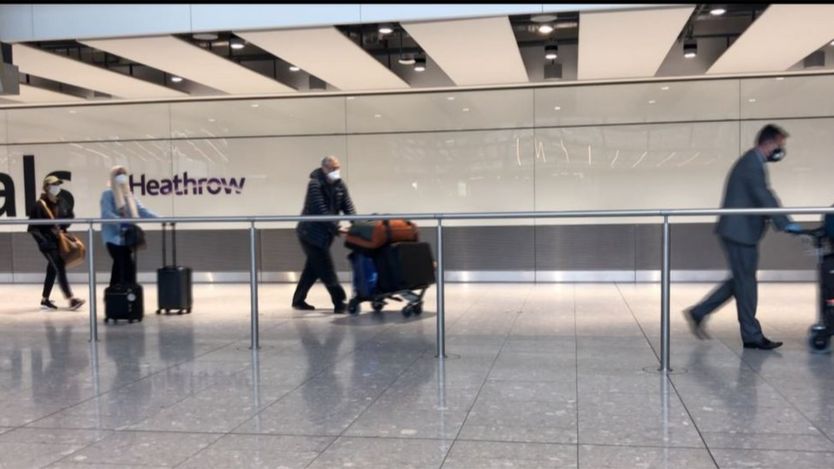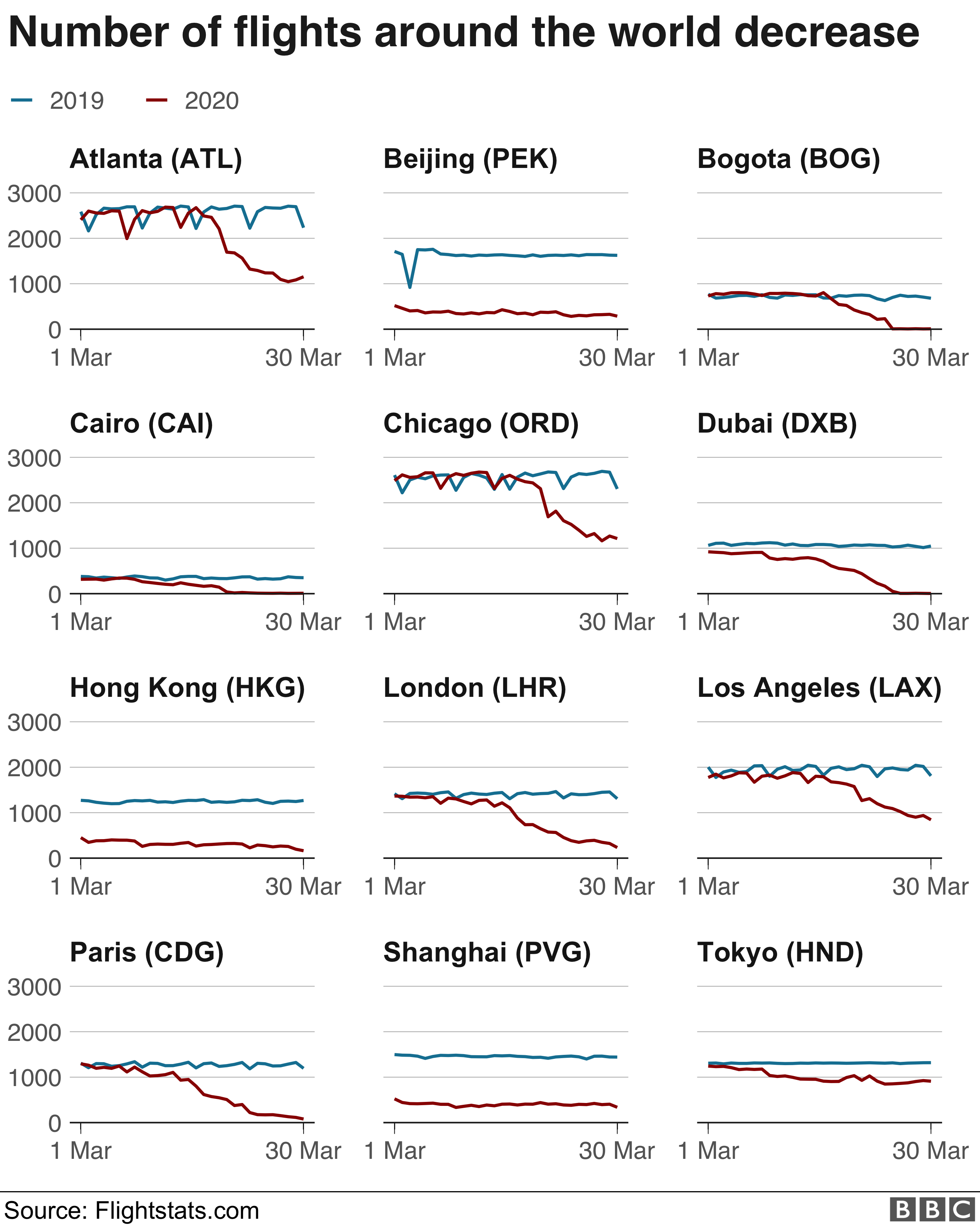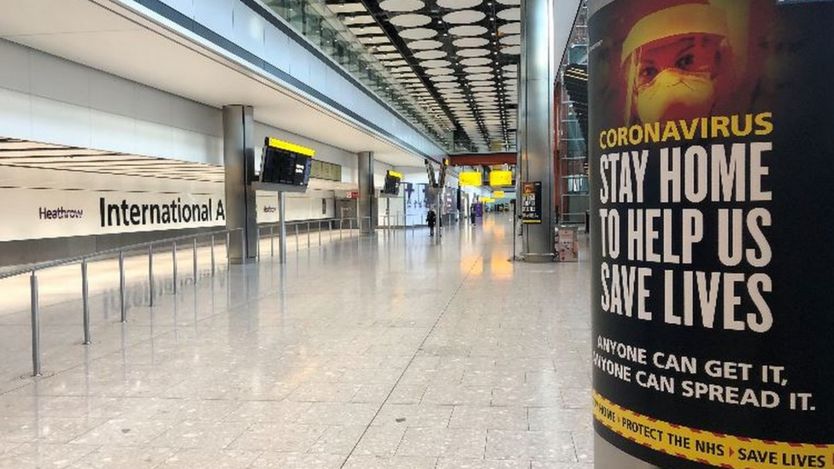- 6,068
- 3,447
- 189
Coronavirus: Who is still flying?
London's Heathrow airport normally has about 600 flights landing on an average day, but in lockdown Britain, about 60 arrive daily.
Other UK airports are receiving a tiny number of flights between them. But the number is still high enough to trouble MPs, who on Friday received a letter from the UK aviation minister explaining why flights were still in the air.
It is the airlines, who say nearly all of their passengers on their flights into Heathrow are people heading home, which decide which routes to run.
"No-one is on holiday," says Airlines UK chief executive Tim Alderslade, whose group represents British Airways, Virgin Atlantic and other UK-based carriers.
That was certainly the picture at a deserted Heathrow Terminal 5 when I visited this week. I watched from a distance as a trickle of mask-sporting passengers appeared after flying in on British Airways from Los Angeles.
Some people on social media have questioned why flights are still coming in from countries such as the US, Italy and Spain, where Covid-19 is also prevalent.
Alitalia said the four daily flights it is now operating between Rome and London are "quite empty" flying into Heathrow.
However, on the return leg to Rome, its aircraft are "almost full" of Italian citizens who want to fly back to Italy. Those people travelling to Italy must fill in a declaration to say that their journey is essential.
And many people flying into Heathrow will transit and fly straight back out again to another destination.
Many airlines would not disclose exactly how many passengers they have been ferrying into London.
However, American Airlines said social distancing had been possible "for all passengers", suggesting that its aircraft have a lot of empty seats.
Passenger numbers have been so low for Dutch carrier KLM that over the past few days, it has had to cancel its only daily flight from Amsterdam Schiphol into Heathrow.
In normal times, it runs 11 of those flights in a single day.
[TD]

Heathrow is seeing just a trickle of mask-wearing passengers arriving[/TD]Virgin Atlantic revealed that many of its commercial flights which have been running over the past couple of weeks have only, on average, been a quarter full.
And my understanding is that British Airways is, globally, currently carrying a minuscule fraction of its usual passenger load.
But if passenger flights are not full of passengers right now, their belly will be full of cargo which, because of demand, now travels at a premium.
Cargo has become a vital source of income for airlines, which have had their passenger revenue slashed in apocalyptic fashion.
At the same time, their high fixed costs, such as maintaining, leasing and parking aircraft, remain.
In specific cases, airlines such as BA and Virgin Atlantic have been using passenger airliners to carry solely cargo, namely medical supplies such as ventilator parts, face masks and protective clothing (PPE).
Over a 10-day period earlier this month, Virgin Atlantic ran 20 cargo-only flights into Heathrow.
It ran just 15 commercial passenger flights over the same period.

When a passenger aircraft is used to carry cargo, most of the seats can be covered with netting, so that supplies can travel in the cabin as well as in the belly of the plane.
Normally, most of the world's air cargo is transported in the hold of passenger aircraft.
But with the vast majority of airliners grounded, cargo companies have had to step up their operations in an effort to meet the demand.
Companies such as FedEx Express, DHL and IAG Cargo (a sister company of BA and Iberia) have been ferrying medical supplies into the UK, namely from China.
There is "a huge demand" for component parts for projects to manufacture respirators in the UK, according to Trevor Hoyle from FedEx Express.
He said his company had also moved "a huge amount" of personal protective equipment (PPE) into the UK in recent days.
 The number of cargo-only flights travelling into Heathrow has grown exponentially throughout the crisis.
The number of cargo-only flights travelling into Heathrow has grown exponentially throughout the crisis.
And despite most passenger flights being grounded, East Midlands Airport, which boasts the UK's "largest dedicated air cargo operation", has seen a rise in overall flight numbers because of the demand for freight.
As for getting people home, BA and Virgin Atlantic are also running official repatriation flights for the Foreign Office.
The UK government says it has brought back 7,300 people on 35 flights since the coronavirus outbreak began in China. However, the vast bulk of people returning have travelled via commercial routes.
It's estimated that 1.3 million people have arrived back in the UK on commercially operated aircraft over that same period, but thousands of British residents are still stranded abroad.
One of those to return was Kiran Sandhu, who was flown home this week from India, where she was visiting family. When she left India, Kiran was given a temperature check and had to answer questions about whether she had Covid-19 symptoms.
But when she landed in the UK, there were no such questions or tests.
"It was a bit confusing," she says. "You just assume that if one airport is doing it, then other airports would follow through with the same regulation and process."
Public Health England says checks are not effective, because some people carrying Covid-19 do not have a temperature and some show no symptoms at all.
This may not remain the case forever. Heathrow's boss says that at some point, tests might have to become the norm in airports around the world, partly so passengers are not confused by inconsistent approaches.
- 17 April 2020
London's Heathrow airport normally has about 600 flights landing on an average day, but in lockdown Britain, about 60 arrive daily.
Other UK airports are receiving a tiny number of flights between them. But the number is still high enough to trouble MPs, who on Friday received a letter from the UK aviation minister explaining why flights were still in the air.
It is the airlines, who say nearly all of their passengers on their flights into Heathrow are people heading home, which decide which routes to run.
"No-one is on holiday," says Airlines UK chief executive Tim Alderslade, whose group represents British Airways, Virgin Atlantic and other UK-based carriers.
That was certainly the picture at a deserted Heathrow Terminal 5 when I visited this week. I watched from a distance as a trickle of mask-sporting passengers appeared after flying in on British Airways from Los Angeles.
Some people on social media have questioned why flights are still coming in from countries such as the US, Italy and Spain, where Covid-19 is also prevalent.
Alitalia said the four daily flights it is now operating between Rome and London are "quite empty" flying into Heathrow.
However, on the return leg to Rome, its aircraft are "almost full" of Italian citizens who want to fly back to Italy. Those people travelling to Italy must fill in a declaration to say that their journey is essential.
- Coronavirus: Airlines 'entering danger zone'
- US airlines to receive $25bn rescue package
- Foreign Office links up with airlines to fly stranded Britons home
And many people flying into Heathrow will transit and fly straight back out again to another destination.
Many airlines would not disclose exactly how many passengers they have been ferrying into London.
However, American Airlines said social distancing had been possible "for all passengers", suggesting that its aircraft have a lot of empty seats.
Passenger numbers have been so low for Dutch carrier KLM that over the past few days, it has had to cancel its only daily flight from Amsterdam Schiphol into Heathrow.
In normal times, it runs 11 of those flights in a single day.

Heathrow is seeing just a trickle of mask-wearing passengers arriving[/TD]
And my understanding is that British Airways is, globally, currently carrying a minuscule fraction of its usual passenger load.
But if passenger flights are not full of passengers right now, their belly will be full of cargo which, because of demand, now travels at a premium.
Cargo has become a vital source of income for airlines, which have had their passenger revenue slashed in apocalyptic fashion.
At the same time, their high fixed costs, such as maintaining, leasing and parking aircraft, remain.
In specific cases, airlines such as BA and Virgin Atlantic have been using passenger airliners to carry solely cargo, namely medical supplies such as ventilator parts, face masks and protective clothing (PPE).
Over a 10-day period earlier this month, Virgin Atlantic ran 20 cargo-only flights into Heathrow.
It ran just 15 commercial passenger flights over the same period.

When a passenger aircraft is used to carry cargo, most of the seats can be covered with netting, so that supplies can travel in the cabin as well as in the belly of the plane.
Normally, most of the world's air cargo is transported in the hold of passenger aircraft.
But with the vast majority of airliners grounded, cargo companies have had to step up their operations in an effort to meet the demand.
Companies such as FedEx Express, DHL and IAG Cargo (a sister company of BA and Iberia) have been ferrying medical supplies into the UK, namely from China.
There is "a huge demand" for component parts for projects to manufacture respirators in the UK, according to Trevor Hoyle from FedEx Express.
He said his company had also moved "a huge amount" of personal protective equipment (PPE) into the UK in recent days.

And despite most passenger flights being grounded, East Midlands Airport, which boasts the UK's "largest dedicated air cargo operation", has seen a rise in overall flight numbers because of the demand for freight.
As for getting people home, BA and Virgin Atlantic are also running official repatriation flights for the Foreign Office.
The UK government says it has brought back 7,300 people on 35 flights since the coronavirus outbreak began in China. However, the vast bulk of people returning have travelled via commercial routes.
It's estimated that 1.3 million people have arrived back in the UK on commercially operated aircraft over that same period, but thousands of British residents are still stranded abroad.
One of those to return was Kiran Sandhu, who was flown home this week from India, where she was visiting family. When she left India, Kiran was given a temperature check and had to answer questions about whether she had Covid-19 symptoms.
But when she landed in the UK, there were no such questions or tests.
"It was a bit confusing," she says. "You just assume that if one airport is doing it, then other airports would follow through with the same regulation and process."
Public Health England says checks are not effective, because some people carrying Covid-19 do not have a temperature and some show no symptoms at all.
This may not remain the case forever. Heathrow's boss says that at some point, tests might have to become the norm in airports around the world, partly so passengers are not confused by inconsistent approaches.

